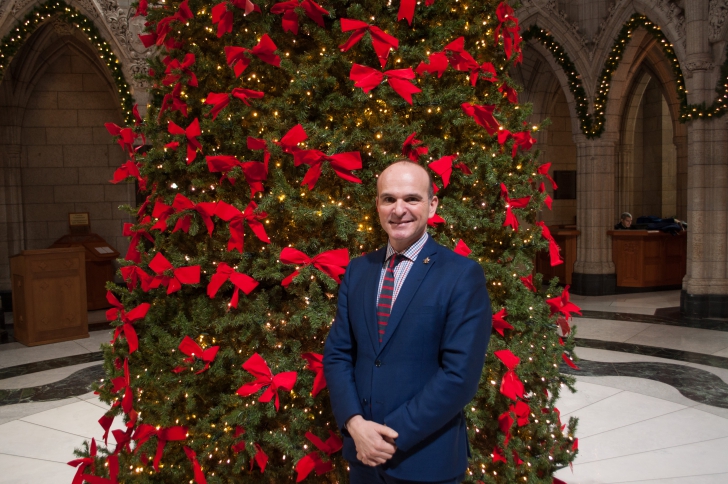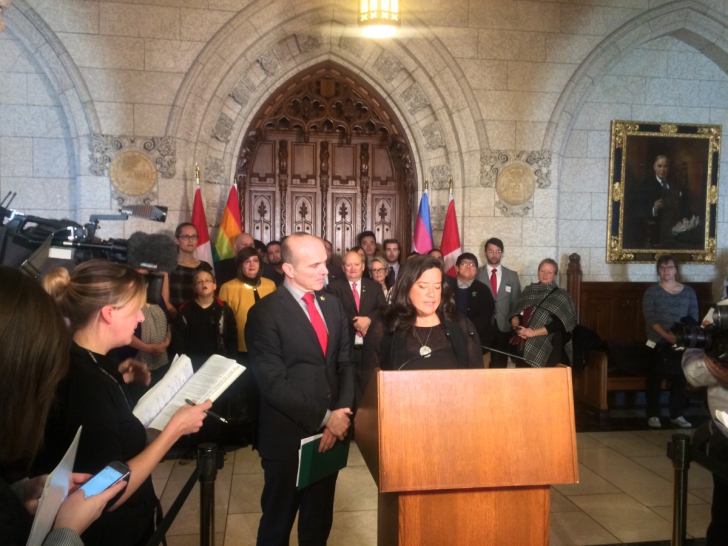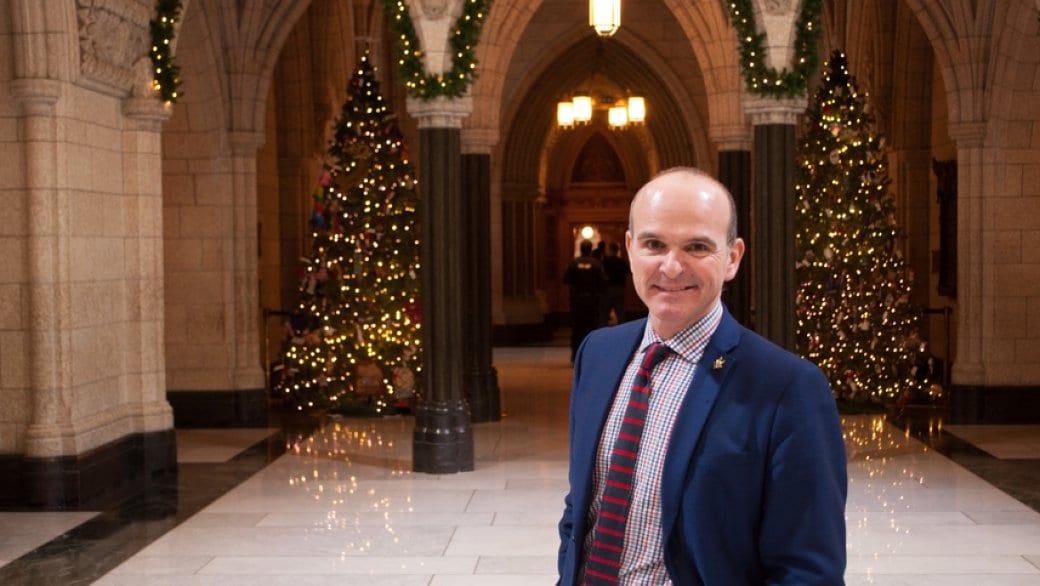The secret to keeping on top of MP Randy Boissonnault’s work is his “gay agenda.”
It’s a Harry Potter notebook, whose cover displays the spell Expecto Patronum. In the Potter series, casting this spell creates a white shield of positive energy to fend off negative spirits.
Boissonnault was appointed by Prime Minister Justin Trudeau in November as the Liberals’ new special advisor on LGBTQ2 issues, to help co-ordinate the government’s response to issues ranging from including trans people in Canada’s human-rights code, to a promised repeal of restrictions on gay men donating blood.
In an interview with Xtra, Boissonnault says the government’s move towards an apology and redress would include creating some kind of historical record for those who were persecuted by the Canadian government.
The federal government intends to move forward on a case-by-case basis if it issues compensation or pardons to people who were jailed and fired for being gay.
“When it comes to compensation, there’s all kinds of models — and it’s also important when we’re looking at anything to do with pardons or discharges that we look at this on a case-by-case basis,” Boissonnault says. “We’re going to look at very many different ways, including leveraging technology, getting people’s stories on the record — doing this is a respectful and sensitive way.”
Boissonnault breaks down his job into three parts: as a focal point for queer Canadians to reach their government, a co-ordinator among multiple government departments and a spokesperson to highlight successes and shortcomings.

Apologies to LGBT community members and compensation for discriminatory federal policies
Boissonnault’s most prominent role involves a three-year timeline to respond to calls for apologies and compensation for discriminatory federal policies, including military dismissals, public-service firings and convictions under laws that Canada’s courts had upheld, but are now seen as homophobic.
Activists have raised these issues for decades, but in June 2016, Egale Canada published an extensive report calling for an apology and compensation. In late October, lawyers affiliated with the group filed class-action lawsuits.
Boissonnault pushes back on criticisms that the Liberals have been slow to act while those who were persecuted keep aging. He says it would be a “mischaracterization of the facts” to say the government waited until a class-action lawsuit to set up a point person. “This appointment, and the thinking that led to the appointment, had been unfolding for many months,” he says.
In November, Xtra reported the government had considered emulating an Australian program which purged criminal convictions without giving compensation. Bureaucrats said they’d be ready to roll out such a program by September 2016.
Boissonnault says the government hasn’t decided on how it will proceed, but stressed that any apology must be accepted, not just given. “As a member of the community, we’re going to take the time necessary in order to get this right,” says Boissonnault, who is gay.

Blood ban on men who have sex with men
Beyond the apology, Boissonnault says he’s committed to getting restrictions on men who have sex with men (MSM) lifted, but hints that “best practices internationally will matter.”
Few countries have moved beyond the one-year abstinence deferral that Canada adopted June 20. The government is hosting a research summit on the issue in late January 2017.
“It’s important for Canadians to realize we are taking all the necessary steps to get to no blood ban,” Boissonnault says. “I was disappointed to see the reduction from five years to one year.”
Adding gender identity and expression to documents and Canada’s human-rights laws
While he also wants to get gender-neutral passports and identity documents underway, Boissonnault notes that it’s a complicated issue when provinces control vital statistics and that only some have moved to introduce a third gender marker. He noted that to just get non-binary and trans people included in the 2021 census involves co-ordinating Industry Canada and Statistics Canada.
Boissonnault says he expects to occasionally travel outside of Canada “to share best practices,” yet stresses “the overwhelming focus of the role is here inside Canada.” In June, the government decided against an NDP proposal to create a special diplomat position for LGBT issues abroad.
Instead, Boissonnault expects to work with indigenous leaders “to make sure that there’s space for two-spirit people within their own communities,” including under pending legislation to encode gender identity and expression in Canada’s human-rights laws.
Response to Marie Curtis Park
This fall, Toronto police conducted a six-week undercover investigation into public sex at Marie Curtis Park and charged 72 people, almost all men. Activists have panned the operation as a “callous overreaction” to public complaints that recalled decades of police raids on gay men.
While acknowledging that city police and provincial bylaws fall outside his mandate, Boissonnault says he’s looking at the controversy to see what lessons authorities can learn.
“This is an example of where we’re going to take a look at what best practices are,” Boissonnault says. He adds that he might look at how police commissions involve LGBT representatives, “and how do they approach enforcement of municipal bylaws.”
“We want to make sure that the [LGBT] community is safe; we want to make sure that the broader community is safe. And people have legitimate concerns on both sides of the issue,” he adds.
Asking for feedback from Xtra readers
When the 2019 election gets underway, Boissonnault will evaluate his overall success by “the results we’re able to deliver for the community.”
“I want to make things better for people — every queer youth, every trans youth, every person who’s in their mid to late 60s or 70s who event through horrible treatment at the hands of the government,” he says. “I want them to feel that the government undersands that what it did was wrong, and that we are moving forward in a completely different spirit.”
He also wants Xtra readers to reach out to him with suggestions.
“I want and need your readers to send us in those good stories, and to let us know what they would like to see in an apology, and what their ideas are for building up to the future,” he says. “We want to know the good, the bad and the ugly.”
Randy Boissonnault’s office can be reached at Randy.Boissonnault@parl.gc.ca

 Why you can trust Xtra
Why you can trust Xtra


